A heat pump is a highly efficient way to both heat and cool your apartment or house — and reduce your carbon emissions, too.
If you visit the state of Maine on a cold winter day, you might hear the whirring of heaters. But there’s something special about most of these heaters: they aren’t boilers or furnaces. Because Maine doesn’t have a solid natural gas infrastructure (making gas expensive), people are encouraged to use heat pumps, which provide heat in the winter and AC in the summer. Best of all, these heat pumps can help to substantially reduce individuals’ carbon footprints.
If you’re an avid follower of climate change news and you’re trying to make your lifestyle more sustainable, you probably know that about 20 percent of fuel emissions in the U.S. come from private cars and trucks. One of the best things you can do to lessen your carbon footprint is to get rid of your car or switch to an electric vehicle. But this swap can be tough, especially because electric vehicles are still expensive and the options are limited.
Read more: Coming Soon: Electric Trucks
That’s why we’re talking about Maine’s trendy heat pumps — they’re another option you can consider if you want to reduce your carbon footprint in everyday life. By many estimates, nearly 20 percent of fossil fuel emissions in the U.S. come from heating residential spaces, and most of that heat comes from boilers that heat water or furnaces that transfer heat to air using natural gas. That’s no small number. So it stands to reason that switching from using a gas furnace or boiler, and choosing an electric heat pump instead, could make a meaningful difference in reducing the greenhouse gas emissions that cause climate change.
A 2021 study from the University of Michigan found that 32 percent of U.S. households would also benefit economically from installing a heat pump, and 70 percent could reduce their emissions. Some reports show that installing a heat pump can reduce emissions by 45 percent per household over 10 years (saving more than 2 tonnes of carbon emissions per home per year). Installing a heat pump also saves households about $800 per year, on average, compared to other heating and cooling systems.
“We also ought to clean up the grid as fast as possible. If we commit to doing that, our previous studies show that heat pumps can reduce environmental and human health harms virtually everywhere in the country,” study author Parth Vaishnav says.
There are two kinds of heat pumps: ground source, or geothermal, and air source. Air source pumps use the air outside of your home as the source for heat in the winter, and the destination for heat in the summer. They’re usually cheaper to install. Geothermal, or ground-source pumps, require piping into the ground, but they can be cheaper for homeowners over the long haul because they rely on the temperature of the ground, which is fairly constant and predictable.
Read more: What You Need to Know About the Wind Energy Revolution
You probably already have a few devices in your house that use this heat pump technology. Both a refrigerator and an air conditioner move heat from one place to another by converting refrigerant from liquid to gas and back again. Fridges and AC units pump heat in reverse — meaning they can only move heat in one direction, and they make air cold. Heat pumps, however, can heat homes in the winter and cool them in the summer because they can move heat in two directions, both cold and hot. Win-win!
Heat pumps have been around for a while, but recently, companies have worked to make them more efficient and affordable. States like Maine have started to offer state-sponsored rebates (including one that offers a $1,500 rebate on heat pumps), which has encouraged widespread adoption. More than 60,000 heat pumps have been sold to Mainers in the past seven years.
Still, convincing people to install heat pumps instead of the typical heating system is tricky, especially in places where natural gas doesn’t cost much. But as these devices become more streamlined — companies like San Francisco startup Gradient are designing heat pumps that could shrink the carbon footprint for heating and cooling by a whopping 75 percent — prices will likely drop.
Read more: 4 Ways Our Clean Energy Future Starts With You
“We realized that air conditioning is an important public health need,” Vince Romanin, CEO of Gradient, told Fast Company. “And we realized that we’re in kind of a vicious cycle where today’s systems are really high carbon emissions and growing in use. It doesn’t have to be this way — technology exists to make heating and cooling systems that don’t have high carbon emissions. The company’s here to break this cycle, and make products that allow you to be cool and comfortable without heating the planet.”
If you’re interested in making this switch, check to see if your state offers rebates for heat pump installations. You’ll want to make sure your home is efficient by fixing air leaks, which will allow you to use your heat pump throughout the winter. You also may want to consider contacting an HVAC professional to make sure the pump you buy is sized appropriately for your home — they can also help you choose between a geothermal and air source pump.
If you want to shrink your carbon footprint, heat pumps are a huge flex. They’re both a money saver and they reduce emissions, plus they can help to both heat and cool your house. And as more and more states offer rebates for heat pump installation, this may become one of the easiest actions yet for combatting emissions on an individual level.
Have feedback on our story? Email [email protected] to let us know what you think!

Shop Pillows
The Essential Organic Pillow Collection
Gentle, breathable, non-toxic support.







